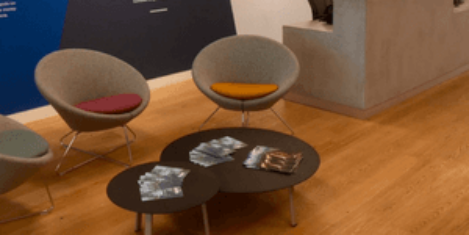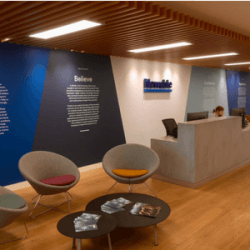October 23, 2018
Technical, social and legal challenges to deployment of wearables in buildings

While there is substantial potential for the deployment of wearables there are also significant technical, social and legal challenges. This is the conclusion of the latest white paper from BSRIA, ‘Wearables & wellbeing in buildings – the story so far’ which found little evidence of any practical solutions linking wearables to HVAC or building systems in general that were already in operation, apart from in “niche areas” such as wearable security fobs. A wearable is a device or an item of clothing which can be worn by a human, or possibly be carried as an implant, which has a degree of “intelligence” built into it and can potentially communicate with the Internet of Things (IoT), either directly or indirectly, for example via a Bluetooth connection to a smart phone. More →










 Over seven in ten UK employees want their employers to do more to motivate them claims a new study from Reward Gateway which suggests that some of the alarming effects that being unmotivated has on employees included a worsening in mood (60 percent); reduction in productivity levels (48 percent); declining mental health (46 percent) and a reduction in quality of work (40 percent). Over a quarter (26 percent) say their relationships with family and friends suffer and 2 in 10 admit to drinking more alcohol when lacking motivation.
Over seven in ten UK employees want their employers to do more to motivate them claims a new study from Reward Gateway which suggests that some of the alarming effects that being unmotivated has on employees included a worsening in mood (60 percent); reduction in productivity levels (48 percent); declining mental health (46 percent) and a reduction in quality of work (40 percent). Over a quarter (26 percent) say their relationships with family and friends suffer and 2 in 10 admit to drinking more alcohol when lacking motivation.


 Despite political and economic uncertainly and the aftermath of the global monetary crisis in 2008, London remains a leading global financial centre, with nearly a quarter (24 percent) of the capital’s office take-up attributed to banking and finance occupiers over the last ten years. London is by far the most active banking centre in Europe, according to the latest research from global real estate advisor CBRE. According to the report, 1.1 million people were employed in the UK financial services sector in 2017, of which 34 percent were in London.
Despite political and economic uncertainly and the aftermath of the global monetary crisis in 2008, London remains a leading global financial centre, with nearly a quarter (24 percent) of the capital’s office take-up attributed to banking and finance occupiers over the last ten years. London is by far the most active banking centre in Europe, according to the latest research from global real estate advisor CBRE. According to the report, 1.1 million people were employed in the UK financial services sector in 2017, of which 34 percent were in London. 


 Although the majority of business leaders rate their business as efficient, nearly a third of respondents to a recent survey waste up to 65 working days per year on administrative tasks, with over half wasting the equivalent of a working month. Priority Software’s Business Process Efficiency Index 2018 suggests business leaders are struggling to take charge of company productivity; and while senior decision-makers expressed the desire to spend more time planning for the future of their businesses, they said too much time is currently occupied by administrative tasks.
Although the majority of business leaders rate their business as efficient, nearly a third of respondents to a recent survey waste up to 65 working days per year on administrative tasks, with over half wasting the equivalent of a working month. Priority Software’s Business Process Efficiency Index 2018 suggests business leaders are struggling to take charge of company productivity; and while senior decision-makers expressed the desire to spend more time planning for the future of their businesses, they said too much time is currently occupied by administrative tasks.
 Under half (47 percent) of British managers ‘completely agree’ that they would recommend their workplace to others, lagging behind other countries, such as Austria (66 percent), Finland (53 percent), Switzerland (53 percent), and France (51 percent). This is according to a Cornerstone OnDemand and IDC survey of over 1,900 European HR, IT and line of business managers,
Under half (47 percent) of British managers ‘completely agree’ that they would recommend their workplace to others, lagging behind other countries, such as Austria (66 percent), Finland (53 percent), Switzerland (53 percent), and France (51 percent). This is according to a Cornerstone OnDemand and IDC survey of over 1,900 European HR, IT and line of business managers, 


 The new northern home of the BBC is giving London a run for its money when it comes to siting offices for the UK’s top tech talent, with Manchester leading the way, according to
The new northern home of the BBC is giving London a run for its money when it comes to siting offices for the UK’s top tech talent, with Manchester leading the way, according to 
 Work/life balance, and the ability to take more annual leave, is the top priority for most European workers and 52 percent explicitly see this as an incentive for choosing certain benefits claims research from SD Worx. Employees in France (63 percent) prioritise this the most across the Europe, next is the UK, whilst workers in Austria (36 percent) and the Netherlands (32 percent) are least likely to opt for additional annual leave. Flexible working also plays a significant role in the benefits employees would choose, with home working allowances being a key factor for 21 percent of respondents and 21 percent wanting a laptop or smartphone included in their benefits package.
Work/life balance, and the ability to take more annual leave, is the top priority for most European workers and 52 percent explicitly see this as an incentive for choosing certain benefits claims research from SD Worx. Employees in France (63 percent) prioritise this the most across the Europe, next is the UK, whilst workers in Austria (36 percent) and the Netherlands (32 percent) are least likely to opt for additional annual leave. Flexible working also plays a significant role in the benefits employees would choose, with home working allowances being a key factor for 21 percent of respondents and 21 percent wanting a laptop or smartphone included in their benefits package. 



















